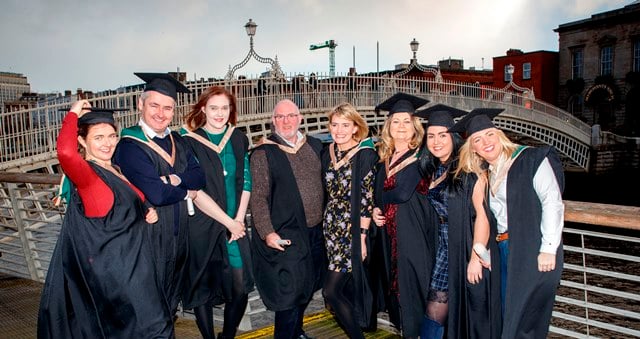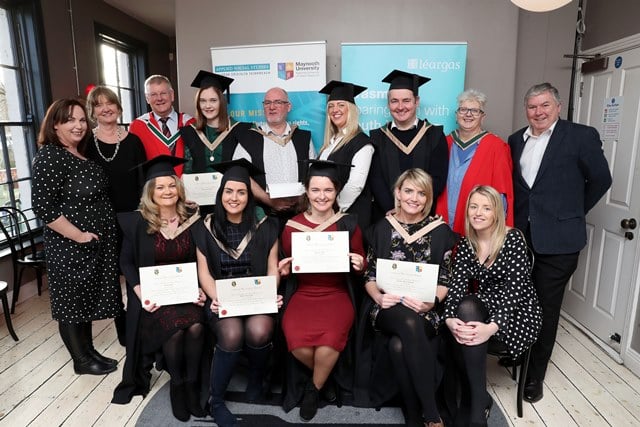Building intercultural youth projects: Certificate in European Youth Mobility Project Management
 January 2018 saw the graduation of the second-cohort students of the Certificate in European Youth Mobility Project Management (NUI Cert). This programme is the first of its kind in Europe and is the culmination of a two-year collaboration between Léargas and the Department of Applied Social Studies in Maynooth University. Marie Cleary, a tutor on the course, describes here what the course offers and how graduates have benefited from it.
January 2018 saw the graduation of the second-cohort students of the Certificate in European Youth Mobility Project Management (NUI Cert). This programme is the first of its kind in Europe and is the culmination of a two-year collaboration between Léargas and the Department of Applied Social Studies in Maynooth University. Marie Cleary, a tutor on the course, describes here what the course offers and how graduates have benefited from it.
Maynooth University, specifically the Department of Applied Social Studies, leads the way in the Irish higher education sector in partnering with external agencies to develop and accredit high quality programmes for the youth and community sectors. Its mission is:
"To promote human rights, social justice and equality, nationally and internationally, through excellence and innovation in education, research and public engagement that contribute to the development of the social professions and applied social sciences."
How the Certificate Works
The NUI Cert is awarded at Level 8 and involves 100 hours of contact time, delivered in block release over three modules. The programme also incorporates a five-day study visit to Finland which offers students an in-depth experience of youth provision in another European country. The programme is aimed at those who work with young people and who are interested in increasing their own intercultural competence so that they can better provide intercultural opportunities for their young people. The programme is underpinned by core youth work and intercultural values and focuses on the skills needed to develop high-quality intercultural projects. It also offers insights into funding mechanisms under Erasmus+.
 Second-cohort graduates of NUI Cert at the Ha'penny Bridge in Dublin in January 2018
Second-cohort graduates of NUI Cert at the Ha'penny Bridge in Dublin in January 2018
To date,18 students have graduated from the programme. In taking part, each student has travelled on a personal journey, enhancing their skills, developing their competence and building new relationships. Some students reported feelings of trepidation at the outset of the programme, wondering if they were equal to the challenge. However, the non-formal learning methodology, around which the programme was designed, created a practical focus supported by theoretical frameworks which made the programme accessible to all.
What happened next?
Following completion of the NUI Cert, several graduates have undertaken substantial European projects with their young people. Two of the most recent graduates were promoted to leadership roles within their organisations and both identified the NUI Cert as an influential factor in this happening. All students highlighted increased confidence in designing and implementing intercultural projects as a hugely positive outcome of undertaking this programme.
A Natural Partnership
Léargas has long experience in bringing the benefits and opportunities of European Programmes to the youth, education and VET sectors. In doing so, they have learned much about the transformational impact of intercultural work on young people. Maynooth University holds the Jean Monnet chair for excellence in intercultural education and was the ideal choice of partner for Léargas to bring this expertise to those best placed to work with young people in an intercultural context.

For 30 years now, young people have been reporting the transformational impact of programmes such as Erasmus+ on their lives. Increasingly, European Union structures recognise the formative power of ‘core skills’/’soft skills’ in building resilience and adaptability in our young people. Increasingly, these skills are being highlighted as necessary to function effectively in our fast-paced, fast-changing technological world. In this context, the Youth sector is leading the way. The focus on personal development skills and individual transformation has always been a central consideration and guiding principle of youth work in Ireland. In the future, the Youth sector is likely be an informant of practice in other education sectors.
Widening the reach to other Colleges
Part of the mission of Léargas is to share the accumulated wisdom gathered over their 30 years of European programme management and project support. In their work, Léargas demonstrate the strategic benefits of Erasmus+ enabling service managers to link policy to practice and situate their work in an intercultural context for the betterment of their young people. It is a future aim to introduce such a module to all the universities and colleges that currently offer programmes in youth and community work.
Léargas is part of a European partnership of National Agencies looking at the introduction of non-formal methods into third-level education. To this end, they are currently offering a two-day programme to selected universities and colleges to trial the non-formal methodology and gauge student reaction and experience. This has already been delivered to the Youth and Community undergraduate population in Maynooth University. By the end of March 2018, this programme will also have been provided to students in Blanchardstown IT and Carlow IT. We intend to present an evaluation of all three programmes at the 'Among Others' international conference in Istanbul, Turkey in April 2018.
Find out more!
If you're interested in the NUI Cert and in the benefits of European mobility and opportunities for young people, you might like to check these links:
‘Bridging the gap’ with the NUI Cert in European Youth Projects (published in July 2015 to mark the launch of the NUI Cert.)
Dr Hilary Tierney on the benefits of mobility at the Time to Move conference in 2016:
Prof. Maurice Devlin's keynote address at the Léargas Forum in 2016 where he spoke about research into the impact that European programmes have on young people who take part.
Image credits: Marc O'Sullivan Photography (blog post); Léargas (Soundcloud thumbnails).
We welcome contributions to 'Insights' at comms@leargas.ie.
